- Home
- Chris Grabenstein
Whack A Mole jc-3 Page 7
Whack A Mole jc-3 Read online
Page 7
CHAPTER SIXTEEN
We catch our first break.
Well, we actually catch two. First: the family that discovered the jars while they waited out the thunderstorm did, indeed, sign the guest book. Second: they were admirably thorough and filled in every detail requested: NAME(S), AGE(S), HOME ADDRESS, ADDRESS WHILE VISITING THE ISLAND.
Ceepak suggests we take the book with us.
“Not many visitors,” he remarks. “About two or three a day. However, given the apparent lack of basic housekeeping and the low level of museum security, there is no telling when those two jars were placed in the bookcase. We may eventually need to talk to every person listed in this register.”
So we pack up the green book, secure The Scrimshaw Room, lock up the museum, and head off to the Seahorse Motel to visit the Pepper Family of Okemos, Michigan. Warren, Brenda, and the kids: Heather (13), Warren Jr. (10), and Maddie (6). I figure Maddie was the one howling like a miniature banshee when she saw the ears bobbing up and down inside their little glass bottles. I don't blame her: I would have done the same thing.
• • •
The Seahorse is an L-shaped brick building with a neon-green sign jutting out from the wall facing Nutmeg Street. At night, the neon flashes through a series of poses turning the tubular seahorse into an underwater bucking bronco.
We walk past the rattling ice machine and head into the office. The nice girl watching TV behind the front desk tells us we're in luck: she just saw the Peppers heading for the pool, which is located around the back of the building.
We say thanks and head that way. The day is cooling off after the thunderstorm, but not the steamy air around the motel. As we walk around to the pool, we're blasted by hot exhaust from the ice machine, the Gatorade vending machine, the coin-operated dryer vent, and every dripping air conditioner we pass.
We round a corner and smell chlorine. I see three kids splashing in a cool blue rectangle about the size of a postage stamp. The parents are sitting in white plastic chairs on the pebbled concrete path lining the pool. The chairs are the kind they always have on sale at Wal-Mart and in the seasonal aisle at the grocery store.
The kids are playing Marco Polo, thrashing and splashing in their blind frenzy to find each other. The pool is, as I mentioned, tiny. Maybe ten feet wide by twelve feet long. It's an in-ground pool but the motel didn't have much ground left to put it in.
Mrs. Pepper sees our uniforms and nudges her husband.
“Warren? It's the police!”
Warren wakes up.
“Hmmm?”
He reaches for his sunglasses and knocks over a beer can snuggled in a foam Koozie.
One of the kids just did a cannonball into the pool. I know this because the seat of my shorts just got soaked.
“Mr. and Mrs. Pepper? I'm Officer John Ceepak of the Sea Haven Police Department. This is my partner, Danny Boyle.”
Ceepak pulls out his pad. “We'd like to ask you a few questions about what you saw at the Howland House Whaling Museum.”
“You mean those … things? In the jars?” whispers Mrs. Pepper.
“You mean the ears?” a boy blurts out from the pool.
“They were gross!” screams the teenaged girl.
“No, they weren't! They were awesome!” I'm figuring the boy is Warren, Jr. “Maybe some sailor lost them to scurvy! We read about scurvy in school. He didn't eat his limes so his ears fell off and then they pickled them!”
Now I hear bawling. A little girl in water wings who wants her big brother to shut up.
“Mommy, make him stop!” Must be Maddie.
“It was disgusting,” says her mother. “I told that woman-she should be ashamed.”
“How long will that ear exhibit be in there?” her husband now asks Ceepak. He sounds genuinely interested.
“Warren?”
“Well, the boy wants to go back … maybe take the cousins … it's kind of educational….”
“The museum will remain closed for the foreseeable future,” says Ceepak.
“Really?” Mr. Pepper sounds disappointed. “I was just telling the guy in 109 about it. He's been coming down here for fifteen years and never even knew they had a museum, let alone one with, you know, mummy ears.”
“Were those King Putt's ears?” Warren Jr. has climbed up the ladder and hauled himself out of the pool. Currently, he is standing beside me, shivering and dripping on my shoes. “Dad says they were probably from like a caveman….”
Ceepak ignores the boy. “Did you see anyone else at the museum, ma'am?”
“No,” says Mrs. Pepper. “We were the only ones inside. It's not a very popular spot. I can see why.”
“Did you see anybody coming out when you were going in?”
“No.”
“You're certain?”
“Positive. We ran in when the thunderstorm started. I told the kids they could look around. Nobody else was in the building until the old lady showed up.”
Ceepak nods. “Thank you, ma'am. Sir. Danny?”
He puts away his notebook and we head back to the parking lot.
“That was certainly helpful,” I say as we drive away. “They can go into the Witless Protection Program.”
“Now, Danny, you know that police work involves a lot of walking down trails that turn into dead ends. However, walk down them we must.”
Ceepak checks the time. It's nearly six P.M.
“Where to now?” I ask. “Any more dead ends we can get out of the way today?”
The radio on the drivetrain hump between us bursts with static.
“Unit Twelve?” It's a female voice. “This is Special Officer Diego. Over.”
Ceepak picks up the microphone. “This is Twelve. Go ahead, Officer Diego.”
“Where are you guys?”
“Seahorse Motel.”
Or more correctly, traveling down a dead-end street to Nowheresville.
“Can you swing by the house?” she asks. “Like right away?”
Ceepak snaps down the microphone button with renewed vigor. “Did you find something on Mary Guarneri?”
“Oh, not much. Just Miss Milk Carton's mother.”
CHAPTER SEVENTEEN
Chief Baines recognizes the significance of our recent finds,” says Ceepak, “and agrees that they warrant further investigation.”
We're huddled around Denise Diego's computer workstation: just the three of us.
“However,” Ceepak says, lowering his voice, “Chief Baines also requests that we keep this matter under the tightest operational security. We three are the only individuals he wants in the know on this. I will personally update the chief regarding our progress on a periodic basis.”
“Should we have like a secret handshake or something?” asks Diego. “I could work up a code….”
Ceepak smiles. “No need, Denise. Just don't discuss this matter with your fellow officers, friends, or family.”
She shrugs and buries her arm in a bag of Cheese Supreme Doritos. I think she's disappointed that the Sea Haven Police Department doesn't afford more opportunity for Dungeons amp; Dragons-type tricks.
“Whatever,” she says.
Diego is a little older than me. And a lot smarter. Her family is Cuban-the ones who said adios to Havana back in the ’60s when Castro came to town. She's got a sweet face and a cute figure. When she tries to talk tough, her big brown eyes usually give her away. She also likes to eat Doritos. Breakfast, lunch, and dinner. She told me once that Doritos are the perfect food. I called them “chemical chips” and she said, “Exactly! That's what makes them such an efficient fuel.”
“Tell us what you found,” says Ceepak.
Diego licks her fingertips and starts clacking on the keyboard.
“This one was pretty simple,” she says. “I did a quick history on those milk-carton pictures. They started putting missing children on the side panels in the late ’70s and early ’80s-after Etan Patz in New York and all those kids in Atlanta disappeared.”
Ceepak nods. Like I said-he's more of a forensics history buff than I am.
“Anyhow, I went to missing-kids-dot-com. It's run by the National Center for Missing amp; Exploited Children. They even have an 800 number: 1-800-THE-LOST. Creepy, hunh? Sounds like a vampire movie. But, then I realize-all the information about missing kids is centralized over at the FBI. So I tap into the NCIC….”
Even I know this one: she's talking about the National Crime Information Center, a computerized database filled with all sorts of info about fugitives, stolen property, and missing persons. The data is available to all federal, state, and local law enforcement agencies 24 hours a day, 365 days a year.
“Anyway,” Diego continues, “I put in the name Mary Guarneri, and the computer spits out the next of kin who posted the original missing child alert: Martha W. Guarneri, 24 West Grove Street, Fresno, CA, 93706.”
“Fresno?” says Ceepak. “That's a long way from New Jersey….”
“Yeah. So, I checked her background. She used to live in West Pennsylvania. Erie. Up near the lake. No husband. Never married. You guys tell me her daughter left home and came to Sea Haven in the summer of 1985. Well, mom left Erie, PA, in 1992.”
“I wonder why,” Ceepak muses.
“You can ask her.” Diego hands him a purple Post-It note. “That's her phone number. She's sixty years old, and she should be home right now. She lives in a one-bedroom rental close to the Fresno Airport. That's why her rent's so cheap.”
Diego winks at me.
“You got all that off the Internet?” I ask.
“Yep. Took me almost an hour.” Another wink. “Be careful, Danny. Big Sister's watching you.”
I nod. I will.
“How do you know she's currently at home?” asks Ceepak.
“Well,” she says as her fingers play across the keyboard, “it's partially supposition on my part. We know she works the early morning shift at Country Waffles on Blackstone Avenue. She gets off at three P.M. and, according to her credit card bills, takes the FAX bus, that's the Fresno Area Express.” She glances at her wristwatch. “It's six fifty here, means it's ten to four out in Fresno. The bus ride takes ten to fifteen minutes.”
I give her a wrinkled brow of disbelief. How could our new Nancy Drew know that?
“Danny,” she says, “FAX posts its schedule online. I simply plotted the shortest route from her job to her home and factored in….”
Ceepak picks up a phone. “Awesome work, Officer Diego.” He glances at the number. “Let's give her a call.” He nods to a vacant desk. “Danny, pick up when I give you the signal.”
“10-4.”
“Denise?” he asks. “If you'd like to….”
“No, thanks.” She gives her Doritos bag a good shake. Crumbs sprinkle down to mingle with the crusty triangles already scattered on her mouse pad. “I need a refill. Can I get you guys anything?”
Ceepak cups his hand over the telephone's mouthpiece, shakes his head. Then he gives me the single-finger hand-chop point. I figure that's my “go” signal to pick up the phone, so I do.
“Hello?” says a tired voice.
“Hello, is this Ms. Martha Guarneri?”
“Yes….” Now she sounds suspicious. “Who's this?”
“Ms. Guarneri, my name is John Ceepak. I am a police officer in Sea Haven, New Jersey.”
There's this tense pause.
“Have you found her body?”
CHAPTER EIGHTEEN
I hear Ms. Guarneri taking in a deep breath to steel herself.
Her voice trembles anyway. “I always knew this day would come. You'd find her body. I'd get a call….”
“Ms. Guarneri? We have not recovered your daughter's body. We do not even know if she is alive or dead.”
“I see. I see.” She heaves a deep sigh. Relief, I guess.
“We did, however, come upon what we suspect is her charm bracelet.”
“Her….”
“Ma'am, did your daughter wear a charm bracelet?”
“Yes, sir. All the time.”
“Do you remember any of the charms she had on it?”
“Sure. Some of 'em. Not all. They were pretty, I remember that. I bought her a couple whenever my tips were good enough. I worked at the Perkins Family Restaurant back then. In Erie.”
“Yes, ma'am.”
“Did she still have that one from New Orleans? I bought her that one. We went down to the World's Fair together in July 1984. I remember the trip. It was a good one. We drove all the way down to Louisiana in my beat-up Buick.” I hear a smile creeping into her voice. “It was real hot and muggy because it was right along the Mississippi river, near that French Quarter they have down there. I guess it was the last summer vacation we ever took together.”
“How old was your daughter when she left home?”
“Seventeen. We'd just had a huge fight.”
“May I ask what about?”
“What else? Boys. She was fooling around like teenagers do, spending too much time with this boy and that. I warned her what could happen. Told her she could get in big trouble if she weren't careful. Told her that's what happened to me.”
“You became pregnant as a teenager?”
“Yes, sir. I ain't proud about it, but I won't lie to you, neither. At the time, I thought I was giving Mary good advice, trying to stop her from doing what I done wrong. She, of course, turned it all around, took it the wrong way. Thought I was saying I wished I'd never had her, which weren't true at all. I loved my baby girl. But she was always Mary, Mary, Quite Contrary. Ran away the day after we had that argument. June 14th, 1985. You think it's strange I still remember the date after all these years?”
“No, ma'am.”
“I went crazy looking for her. Couldn't afford to hire no private detective or nothing like that but I did what I could. Put her picture up everywhere I could think. Even slipped it into the menu binders there at Perkins. The police in Erie put me in touch with the milk carton people and they put her face in front of the whole country for about a month….”
Her voice drifts off.
“Ms. Guarneri?”
“Yes?”
“Why did you think we had found your daughter's body?”
“You said you was from Sea Haven. Sea Haven, New Jersey?”
“That's right.”
“Mary sent me a postcard from there one time. Only one I ever did get after she took off. Only time I ever even heard from her. I still have it hanging on my refrigerator. ‘Greetings From Sea Haven, New Jersey,’ it says. Looks like a nice beach.”
“Did Mary tell you anything about the time she spent here? Did she write any kind of message on the back?”
“Not much. Just … hold on … I'm here in the kitchen. Just a second….”
We wait while she walks from the phone to the fridge and back again. I wonder how many times she has stared at that particular postcard, how many times she's read the words scribbled on the back.
“Here we go,” she says when she returns to the phone. She's sniffing back tears. “I'll read it to you. ‘Dear Mom. How are you? I am fine. I am here with some new friends. They are my new brothers and sisters. Do not worry. I am fine. Please forgive me. He already has.’ That's all she wrote.”
“Who is he?” asks Ceepak. “The one she says forgave her?”
“I don't rightly know. I figure it must be the boy-the one who got her pregnant. I figure she had an abortion.”
“Was your daughter pregnant?”
“I don't know. If she was, she never did tell me. But I always figured that might be what made her run away like that-'specially after I scared her off with my little lecture. Soon as I got that card, I called the police down there in Sea Haven. Spoke to a man … I believe his name was Gus. Yes. Gus. I remember because I had me an uncle named Gus and he sounded a lot like this fellow did. Kind of put-out, you know what I'm saying? Like a customer who hollers at you to hurry up and bring him his coffee because he ain't had a
ny yet.”
Sounds like our retired desk sergeant: Gus Davis. Or, as we used to call him, “Gus The Grouch.”
“Was this police officer able to help you in any way?”
“No. Not really. I called him three or four times that summer and into the fall. Called him near Christmas time, too. He said he'd get back to me if there were any new developments. Guess there never were none. He never did call back.”
“I'm sorry.”
“Well, sir, I don't blame him. Guess it's hard for you folks to find someone if they don't want to be found-'specially when they go and change their name.”
“Your daughter changed her name?”
“Yes, sir. ‘Ruth.’ That's how she signed the card. Of course, I recognized her handwriting and all. Mary never were no Ruth. That weren't even her middle name. I have no idea why she signed herself that way.”
Ceepak and I look at each other.
Ruth.
It's the name somebody wrote on that specimen jar we found at the Whaling Museum.
CHAPTER NINETEEN
We drive toward the setting sun, over to the bay side of the island.
Retired desk sergeant Gus Davis spends most of his time on his fishing boat, especially in the summer. He says it helps his marriage: he and his wife get along better if they only see each three times a day-coffee, dinner, and the ten o'clock news.
Gus's boat, a thirty-eight-footer, is usually docked at the public pier near Cherry Street. Ceepak and I park in a crumbling patch of asphalt close to the pier pilings.
“Here he comes,” says Ceepak, pointing to a puttering fishing boat followed up the inlet by a flock of hungry gulls.
Then I hear Gus, yelling at the birds swooping down to check out his catch.
“Get outta here, you freaking mooch birds! Find your own freaking fish….”
It's a wonder the birds don't snag their wings on all the poles and antennae and outriggers jutting out above the boat. Gus pulls back on the throttle, churns up some water, and reverses engines to wharf in his berth.
“Throw me the line, Danny,” he hollers. “Freaking mooch birds!”

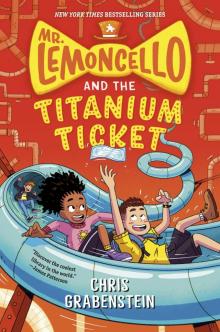 Mr. Lemoncello and the Titanium Ticket
Mr. Lemoncello and the Titanium Ticket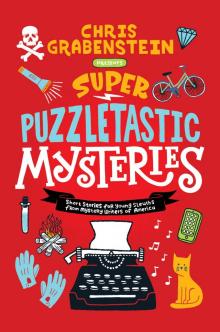 Super Puzzletastic Mysteries
Super Puzzletastic Mysteries Sandapalooza Shake-Up
Sandapalooza Shake-Up Welcome to Wonderland #4
Welcome to Wonderland #4 The Smartest Kid in the Universe
The Smartest Kid in the Universe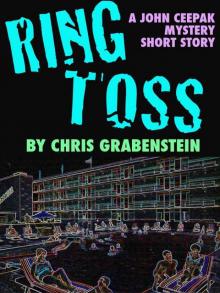 RING TOSS A John Ceepak Mystery Short (The John Ceepak Mysteries)
RING TOSS A John Ceepak Mystery Short (The John Ceepak Mysteries)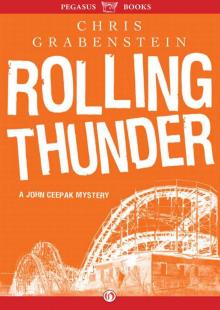 Rolling Thunder (John Ceepak Mystery)
Rolling Thunder (John Ceepak Mystery) Don't Call Me Christina Kringle
Don't Call Me Christina Kringle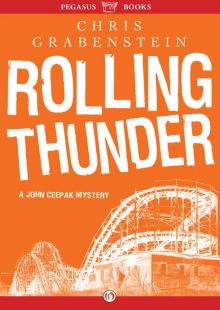 Rolling Thunder
Rolling Thunder The Crossroads
The Crossroads Hell Hole
Hell Hole Beach Party Surf Monkey
Beach Party Surf Monkey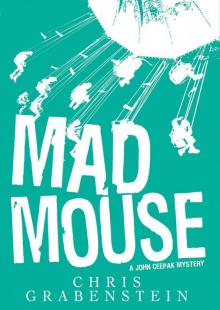 Mad Mouse: A John Ceepak Mystery (The John Ceepak Mysteries)
Mad Mouse: A John Ceepak Mystery (The John Ceepak Mysteries) Mind Scrambler
Mind Scrambler Home Sweet Motel
Home Sweet Motel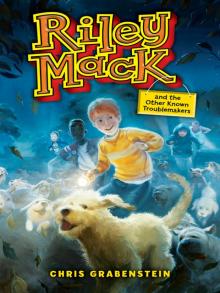 Riley Mack and the Other Known Troublemakers
Riley Mack and the Other Known Troublemakers The Island of Dr. Libris
The Island of Dr. Libris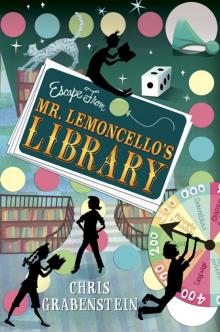 Escape From Mr. Lemoncello's Library
Escape From Mr. Lemoncello's Library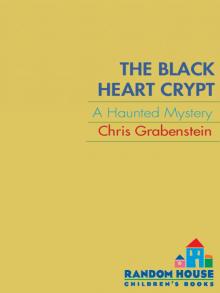 The Black Heart Crypt
The Black Heart Crypt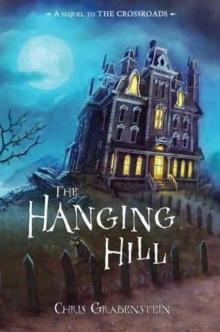 The Hanging Hill
The Hanging Hill Mr. Lemoncello's Great Library Race
Mr. Lemoncello's Great Library Race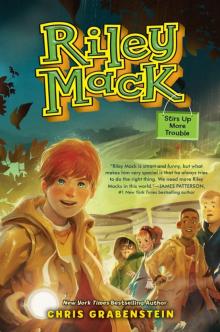 Riley Mack Stirs Up More Trouble
Riley Mack Stirs Up More Trouble Fun House (John Ceepak Mystery)
Fun House (John Ceepak Mystery) Whack A Mole: A John Ceepak Mystery (The John Ceepak Mysteries)
Whack A Mole: A John Ceepak Mystery (The John Ceepak Mysteries) Mr. Lemoncello's Library Olympics
Mr. Lemoncello's Library Olympics Tilt-a-Whirl jc-1
Tilt-a-Whirl jc-1 The Explorers’ Gate
The Explorers’ Gate The Smoky Corridor
The Smoky Corridor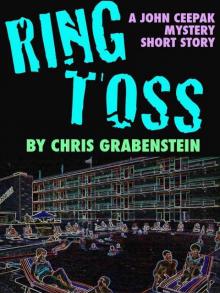 Ring Toss (john ceepak)
Ring Toss (john ceepak) Whack A Mole jc-3
Whack A Mole jc-3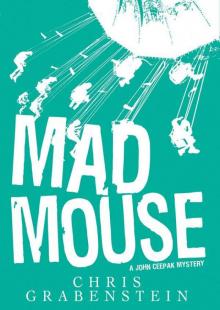 Mad Mouse js-2
Mad Mouse js-2 Tilt-a-Whirl (The John Ceepak Mysteries)
Tilt-a-Whirl (The John Ceepak Mysteries) Free Fall
Free Fall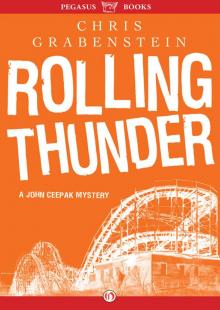 Rolling Thunder jc-6
Rolling Thunder jc-6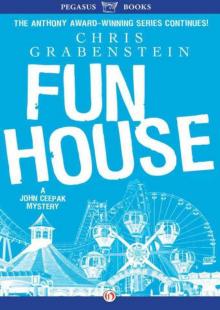 Fun House jc-7
Fun House jc-7